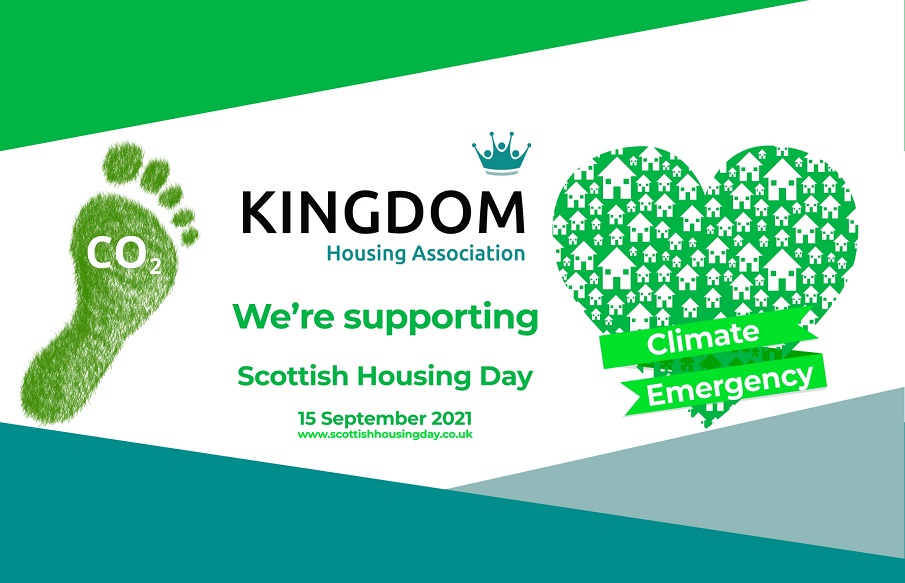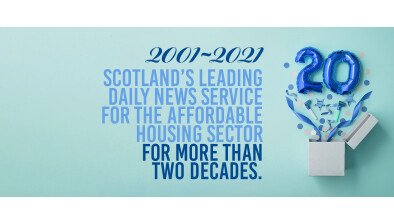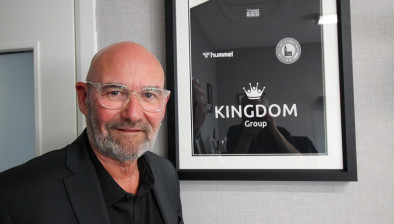Kingdom Housing Association outlines carbon journey
With Scottish Housing Day’s focus on housing and the climate emergency, Kingdom Housing Association has taken time to reflect on its own low carbon journey, whilst also considering its role as part of a sector committed to tackling climate change.

Carbon emissions have very much been thrown into the spotlight in recent years, particularly given the Scottish Government’s ambition to achieve net zero emissions by 2045. Coupling this with the arrival of the highly anticipated United Nations COP26 Conference in Glasgow later this year, it is clear that attention will be drawn to the world’s greener/decarbonised recovery post-COVID-19. It is therefore fitting that this year’s Scottish Housing Day focuses on the important role our sector can play.
At Kingdom, our commitment to innovation and sustainability has been long-standing, with our low carbon journey and strive for greener developments beginning some time ago. As we reflect on our journey, it is clear our success is very much the result of a willingness to be involved in pilot projects and initiatives which can inform future decision making.
Casting our minds to the beginning of this journey takes us to 1999, a year which marked the completion of our very first greener housing project - Turner Crescent, Methil. A pilot project centred around energy efficiency and sustainability, Turner Crescent incorporated a variety of efficient features in an attempt to apply environmental principles and reduce running costs for tenants. The specification included; solar panels, sun-stores to maximise solar gain and breathable walls - many of which we find are commonplace within our current developments.
Fast forward to 2010 takes us to perhaps our most memorable moment to date, the completion of The Kingdom House in Pittenweem. This highly sustainable, net zero carbon family home became the first Passivhaus Accredited home for social rent in the UK and received the National Green Champion Award in 2011. Built to assist with on-going research into modern methods of construction (MMC) throughout Fife, the enhanced design and thermal insulation of this property drastically reduced the energy required for heating. Although challenging, this truly was a remarkable achievement and the knowledge we and the project team gained and shared with both the housing and construction sectors far outweighed the hard work involved.
Following this success we progressed onto a project which may be considered our most informative to date, our Housing Innovation Showcase (HIS) in Dunfermline. In an attempt to showcase innovation, MMC and energy efficiency in affordable housing, 27 new homes were built using 10 different house systems, including off-site modular and panelised. In addition to promoting sustainable construction a building performance study was carried out to monitor the as-built performance against design predictions, end user satisfaction and system adaptability and longer term performance. Outcomes from this 4 year study have been used to assess the capabilities of mainstreaming across our affordable housing programme.
With increasing air-tightness levels in new homes our HIS project highlighted the importance of having the right ventilation strategies in place to ensure good indoor air quality. With this in mind we adopted a fabric first approach in the design of our Fraser Avenue Regeneration project and commissioned the use of a breathable system to maximise the thermal efficiency of the new homes and produce a considerably healthier living environment. A building performance study of these new homes is currently underway in partnership with Glasgow School of Art.
As we look to the future, and consider our role in fighting climate change it is clear our low carbon journey is far from over. Determined not to get caught up on our past successes, we are committed to striving towards a mainstream programme centred around sustainability and net carbon. This ambition is demonstrated through a number of projects currently on-site, namely Queensgate Glenrothes and Pilmuir Street Dunfermline. Adopting low carbon heating solutions, both projects will tap into local district heating networks resulting in carbon reductions and a reduced dependence on fossil fuels. Although the benefits of utilising this form of heating will not be fully known until after completion, our Queensgate project has been used to inform the Scottish Government’s work in developing their New Build Heat Standard which is to be implemented from 2024.
Building on the success of The Kingdom House, our next ambitious venture centers around the delivery of a net zero Passivhaus development comprising 30 family and amenity homes for social rent and the inclusion of electric vehicle charging provision. Although ambitious, this is an extremely exciting project for all involved and really emphasises our commitment to sustainability - in fact, if all goes according to plan, it will be our most efficient development to date!
Although we are proud of our journey so far, we are eager to continue to help the sector support the Scottish Government’s Housing to 2040 strategy and climate change ambitions. We strive to utilise MMC, low carbon heating solutions and other alternative methods which can offer greater energy efficiencies than more traditional builds.
On Scottish Housing Day, we too urge other developers, RSLs and consultants to reflect on their low carbon journey and ponder where we can all actively contribute to reducing the sector’s carbon footprint.







